Deck 11: Risk and Return in Capital Markets
Question
Question
Question
Question
Question
Question
Question
Question
Question
Question
Question
Question
Question
Question
Question
Question
Question
Question
Question
Question
Question
Question
Question
Question
Question
Question
Question
Question
Question
Question
Question
Question
Question
Question
Question
Question
Question
Question
Question
Question
Question
Question
Question
Question
Question
Question
Question
Question
Question
Question
Question
Question
Question
Question
Question
Question
Question
Question
Question
Question
Question
Question
Question
Question
Question
Question
Question
Question
Question
Question
Question
Question
Question
Question
Question
Question
Question
Question
Question
Question

Unlock Deck
Sign up to unlock the cards in this deck!
Unlock Deck
Unlock Deck
1/110
Play
Full screen (f)
Deck 11: Risk and Return in Capital Markets
1
Amazon.com stock prices gave a realized return of 5%, -5%, 11%, and -11% over four successive quarters. What is the annual realized return for Amazon.com for the year?
A) -1.46%
B) 2.91%
C) 0.00%
D) 1.46%
A) -1.46%
B) 2.91%
C) 0.00%
D) 1.46%
-1.46%
2
Greg purchased stock in Bear Stearns and Co. at a price of $88 per share one year ago. The company was acquired by JP Morgan at a price of $11 per share. What is Greg's return on his investment?
A) -87.50%
B) -113.75%
C) -100.62%
D) -96.25%
A) -87.50%
B) -113.75%
C) -100.62%
D) -96.25%
-87.50%
3
Suppose you invested $100 in the Ishares High Yield Fund (HYG) a month ago. It paid a dividend of $2 today and then you sold it for $95. What was your dividend yield and capital gains yield on the investment?
A) 2%, -5%
B) 2%, 5%
C) -2%, 5%
D) 5%, 2%
A) 2%, -5%
B) 2%, 5%
C) -2%, 5%
D) 5%, 2%
2%, -5%
4
Suppose you invested $93 in the Ishares High Yield Fund (HYG) a month ago. It paid a dividend of $0.53 today and then you sold it for $94. What was your dividend yield and capital gains yield on the investment?
A) 0.54%, 1.13%
B) 0.57%, 1.08%
C) 0.57%, 1.13%
D) 1.08%, 1.18%
A) 0.54%, 1.13%
B) 0.57%, 1.08%
C) 0.57%, 1.13%
D) 1.08%, 1.18%

Unlock Deck
Unlock for access to all 110 flashcards in this deck.
Unlock Deck
k this deck
5
Which of the following investments offered the lowest overall return over the past eighty years?
A) small stocks
B) Treasury bills
C) S&P 500
D) corporate bonds
A) small stocks
B) Treasury bills
C) S&P 500
D) corporate bonds

Unlock Deck
Unlock for access to all 110 flashcards in this deck.
Unlock Deck
k this deck
6
Which of the following investments offered the highest overall return over the past eighty years?
A) Treasury bills
B) S&P 500
C) small stocks
D) corporate bonds
A) Treasury bills
B) S&P 500
C) small stocks
D) corporate bonds

Unlock Deck
Unlock for access to all 110 flashcards in this deck.
Unlock Deck
k this deck
7
Which of the following investments had the largest fluctuations overall return over the past eighty years?
A) small stocks
B) S&P 500
C) corporate bonds
D) Treasury bills
A) small stocks
B) S&P 500
C) corporate bonds
D) Treasury bills

Unlock Deck
Unlock for access to all 110 flashcards in this deck.
Unlock Deck
k this deck
8
Historically, stocks have delivered a ________ return on average compared to Treasury bills but have experienced ________ fluctuations in values.
A) higher, higher
B) higher, lower
C) lower, higher
D) lower, lower
A) higher, higher
B) higher, lower
C) lower, higher
D) lower, lower

Unlock Deck
Unlock for access to all 110 flashcards in this deck.
Unlock Deck
k this deck
9
You own shares in Supernova Inc. that were purchased at a price of $23 per share. Quicksilver Inc. has offered to purchase Supernova Inc. and buy your shares at a price of $34 per share. What will be your return if you tender your shares to Quicksilver Inc. and the deal is completed?
A) 47.83%
B) 33.48%
C) 50.22%
D) 45.43%
A) 47.83%
B) 33.48%
C) 50.22%
D) 45.43%

Unlock Deck
Unlock for access to all 110 flashcards in this deck.
Unlock Deck
k this deck
10
On average, stocks have delivered higher returns than bonds in the long run.

Unlock Deck
Unlock for access to all 110 flashcards in this deck.
Unlock Deck
k this deck
11
Your investment over one year yielded a capital gains yield of 5% and no dividend yield. If the sale price was $114 per share, what was the cost of the investment?
A) $119.43
B) $103.14
C) $108.57
D) $114.00
A) $119.43
B) $103.14
C) $108.57
D) $114.00

Unlock Deck
Unlock for access to all 110 flashcards in this deck.
Unlock Deck
k this deck
12
Stocks with high returns are expected to have ________.
A) high variability
B) low variability
C) no relation to variability
D) inverse relationship with variability
A) high variability
B) low variability
C) no relation to variability
D) inverse relationship with variability

Unlock Deck
Unlock for access to all 110 flashcards in this deck.
Unlock Deck
k this deck
13
Suppose you invested $60 in the Ishares Dividend Stock Fund (DVY) a month ago. It paid a dividend of $0.63 today and then you sold it for $65. What was your return on the investment?
A) 6.57%
B) 7.51%
C) 9.38%
D) 10.32%
A) 6.57%
B) 7.51%
C) 9.38%
D) 10.32%

Unlock Deck
Unlock for access to all 110 flashcards in this deck.
Unlock Deck
k this deck
14
Investors demand a higher return for investments that have larger fluctuations in values because ________.
A) they do not like risk
B) they are risk seeking
C) they invest for the long term
D) they prefer fluctuations
A) they do not like risk
B) they are risk seeking
C) they invest for the long term
D) they prefer fluctuations

Unlock Deck
Unlock for access to all 110 flashcards in this deck.
Unlock Deck
k this deck
15
Rational investors ________ fluctuations in the value of their investments.
A) are averse to
B) prefer
C) are indifferent to
D) are in favor of
A) are averse to
B) prefer
C) are indifferent to
D) are in favor of

Unlock Deck
Unlock for access to all 110 flashcards in this deck.
Unlock Deck
k this deck
16
Suppose you invested $100 in the Ishares High Yield Fund (HYG) a month ago. It paid a dividend of $2 today and then you sold it for $100. What was your dividend yield and capital gains yield on the investment?
A) 2%, 2%
B) 0%, 2%
C) 3%, 2%
D) 2%, 0%
A) 2%, 2%
B) 0%, 2%
C) 3%, 2%
D) 2%, 0%

Unlock Deck
Unlock for access to all 110 flashcards in this deck.
Unlock Deck
k this deck
17
Amazon.com stock prices gave a realized return of 15%, 15%, -15%, and -15% over four successive quarters. What is the annual realized return for Amazon.com for the year?
A) -4.45%
B) -7.12%
C) -5.12%
D) 0%
A) -4.45%
B) -7.12%
C) -5.12%
D) 0%

Unlock Deck
Unlock for access to all 110 flashcards in this deck.
Unlock Deck
k this deck
18
In the United States over the long term, small stocks have provided the highest return followed by the large stocks in the S&P 500.

Unlock Deck
Unlock for access to all 110 flashcards in this deck.
Unlock Deck
k this deck
19
Suppose you invested $79 in the Ishares Dividend Stock Fund (DVY) a month ago. It paid a dividend of $0.41 today and then you sold it for $66. What was your return on the investment?
A) -20.72%
B) -$15.94%
C) -18.33%
D) -17.53%
A) -20.72%
B) -$15.94%
C) -18.33%
D) -17.53%

Unlock Deck
Unlock for access to all 110 flashcards in this deck.
Unlock Deck
k this deck
20
Suppose you invested $59 in the Ishares Dividend Stock Fund (DVY) a month ago. It paid a dividend of 0.38 today and then you sold it for $66. What was your return on the investment?
A) 8.76%
B) 13.76%
C) 12.51%
D) 10.01%
A) 8.76%
B) 13.76%
C) 12.51%
D) 10.01%

Unlock Deck
Unlock for access to all 110 flashcards in this deck.
Unlock Deck
k this deck
21
Suppose the quarterly arithmetic average return for a stock is 10% per quarter and the stock gives a return of 15% each over the next two quarters. The arithmetic average return over the six quarters is ________.
A) 15.17%
B) 11.67%
C) 12.83%
D) 16.33%
A) 15.17%
B) 11.67%
C) 12.83%
D) 16.33%

Unlock Deck
Unlock for access to all 110 flashcards in this deck.
Unlock Deck
k this deck
22
Amazon.com stock prices gave a realized return of 15%, 15%, 15%, and 10% over four successive quarters. What is the annual realized return for Amazon.com for the year?
A) 60.57%
B) 67.30%
C) 53.84%
D) 74.03%
A) 60.57%
B) 67.30%
C) 53.84%
D) 74.03%

Unlock Deck
Unlock for access to all 110 flashcards in this deck.
Unlock Deck
k this deck
23
If the returns on a stock index can be characterized by a normal distribution with mean 12%, the probability that returns will be lower than 12% over the next period equals ________.
A) 50%
B) 25%
C) 46%
D) 33%
A) 50%
B) 25%
C) 46%
D) 33%

Unlock Deck
Unlock for access to all 110 flashcards in this deck.
Unlock Deck
k this deck
24
If asset A's return is exactly two times asset B's return, then following risk return tradeoff, the standard deviation of asset A should be ________ times the standard deviation of asset B.
A) 3
B) 2
C) 1
D) 4
A) 3
B) 2
C) 1
D) 4

Unlock Deck
Unlock for access to all 110 flashcards in this deck.
Unlock Deck
k this deck
25
The S&P 500 index delivered a return of 20%, -10%, 20%, and 5% over four successive years. What is the arithmetic average annual return for four years?
A) 10.50%
B) 13.13%
C) 8.75%
D) 9.63%
A) 10.50%
B) 13.13%
C) 8.75%
D) 9.63%

Unlock Deck
Unlock for access to all 110 flashcards in this deck.
Unlock Deck
k this deck
26
You purchase a 30-year, zero-coupon bond for a price of $25. The bond will pay back $100 after 30 years and make no interim payments. The annual compounded return (geometric average return) on this investment is ________.
A) 4.49%
B) 5.68%
C) 4.02%
D) 4.73%
A) 4.49%
B) 5.68%
C) 4.02%
D) 4.73%

Unlock Deck
Unlock for access to all 110 flashcards in this deck.
Unlock Deck
k this deck
27
Treasury bill returns are 4%, 3%, 2%, and 5% over four years. The standard deviation of returns of Treasury bills is ________.
A) 1.55%
B) 1.03%
C) 0.90%
D) 1.29%
A) 1.55%
B) 1.03%
C) 0.90%
D) 1.29%

Unlock Deck
Unlock for access to all 110 flashcards in this deck.
Unlock Deck
k this deck
28
Ford Motor Company had realized returns of 15%, 30%, -15%, and -30% over four quarters. What is the quarterly standard deviation of returns for Ford?
A) 24.65%
B) 32.86%
C) 27.39%
D) 30.12%
A) 24.65%
B) 32.86%
C) 27.39%
D) 30.12%

Unlock Deck
Unlock for access to all 110 flashcards in this deck.
Unlock Deck
k this deck
29
Bear Stearns' stock price closed at $98, $103, $58, $29, $4 over five successive weeks. The weekly standard deviation of the stock price calculated from this sample is ________.
A) $30.07
B) $49.40
C) $42.96
D) $34.37
A) $30.07
B) $49.40
C) $42.96
D) $34.37

Unlock Deck
Unlock for access to all 110 flashcards in this deck.
Unlock Deck
k this deck
30
Ford Motor Company had realized returns of 10%, 20%, -10%, and -10% over four quarters. What is the quarterly standard deviation of returns for Ford?
A) 12.75%
B) 14.25%
C) 13.50%
D) 15.00%
A) 12.75%
B) 14.25%
C) 13.50%
D) 15.00%

Unlock Deck
Unlock for access to all 110 flashcards in this deck.
Unlock Deck
k this deck
31
The S&P 500 index delivered a return of 25%, 15%, -35%, and -5% over four successive years. What is the arithmetic average annual return for four years?
A) -5%
B) 0%
C) 5%
D) 3%
A) -5%
B) 0%
C) 5%
D) 3%

Unlock Deck
Unlock for access to all 110 flashcards in this deck.
Unlock Deck
k this deck
32
The geometric average annual return for a large capitalization stock portfolio is 10% for ten years and 6% per year for the next five years. The geometric average annual return for the entire 15 year period is ________.
A) 9.08%
B) 8.65%
C) 8.22%
D) 9.52%
A) 9.08%
B) 8.65%
C) 8.22%
D) 9.52%

Unlock Deck
Unlock for access to all 110 flashcards in this deck.
Unlock Deck
k this deck
33
Suppose that a stock gave a realized return of 20% over a two-year time period and a 10% return over the third year. The geometric average annual return is ________.
A) 8.28%
B) 12.43%
C) 14.08%
D) 16.57%
A) 8.28%
B) 12.43%
C) 14.08%
D) 16.57%

Unlock Deck
Unlock for access to all 110 flashcards in this deck.
Unlock Deck
k this deck
34
You purchased Alpha Innovative Inc. stock at a price of $25 per share. Its price was $15 after six months and the company declared bankruptcy at the end of the next six months. The realized return over the last year is ________.
A) -99%
B) -75%
C) -150%
D) -100%
A) -99%
B) -75%
C) -150%
D) -100%

Unlock Deck
Unlock for access to all 110 flashcards in this deck.
Unlock Deck
k this deck
35
The probability mass between two standard deviations around the mean for a normal distribution is ________.
A) 66%
B) 90%
C) 75%
D) 95%
A) 66%
B) 90%
C) 75%
D) 95%

Unlock Deck
Unlock for access to all 110 flashcards in this deck.
Unlock Deck
k this deck
36
The standard deviation of returns of ________. I. small stocks is higher than that of large stocks
 Which statement is true?
Which statement is true?
A) I and III
B) I, II, and III
C) I and II
D) I only
 Which statement is true?
Which statement is true?A) I and III
B) I, II, and III
C) I and II
D) I only

Unlock Deck
Unlock for access to all 110 flashcards in this deck.
Unlock Deck
k this deck
37
The S&P 500 index delivered a return of 10%, 15%, 15%, and -30% over four successive years. What is the arithmetic average annual return for four years?
A) 3.00%
B) 3.50%
C) 2.25%
D) 2.50%
A) 3.00%
B) 3.50%
C) 2.25%
D) 2.50%

Unlock Deck
Unlock for access to all 110 flashcards in this deck.
Unlock Deck
k this deck
38
IGM Realty had stock prices of $33, $33, $38, $36, and $28 at the end of the last five quarters. If IGM pays a dividend of $1 at the end of each quarter, what is the annual realized return on IGM?
A) -5.62%
B) -4.49%
C) -4.72%
D) -4.94%
A) -5.62%
B) -4.49%
C) -4.72%
D) -4.94%

Unlock Deck
Unlock for access to all 110 flashcards in this deck.
Unlock Deck
k this deck
39
Ford Motor Company had realized returns of 20%, 30%, 30%, and 20% over four quarters. What is the quarterly standard deviation of returns for Ford calculated from this sample?
A) 5.77%
B) 5.20%
C) 6.06%
D) 4.62%
A) 5.77%
B) 5.20%
C) 6.06%
D) 4.62%

Unlock Deck
Unlock for access to all 110 flashcards in this deck.
Unlock Deck
k this deck
40
If returns on stock A are more volatile than the returns on stock B, the geometric average return of stock A will be ________ the geometric average return of stock B when their arithmetic average returns are same.
A) same as
B) higher than
C) lower than
D) always same as
A) same as
B) higher than
C) lower than
D) always same as

Unlock Deck
Unlock for access to all 110 flashcards in this deck.
Unlock Deck
k this deck
41
The Ishares Bond Index fund (TLT) has a mean and annual standard deviation of returns of 5% and 10%, respectively. What is the 66% confidence interval for the returns on TLT?
A) -7%, 10%
B) 5%, 10%
C) -5%, 15%
D) -10%, 10%
A) -7%, 10%
B) 5%, 10%
C) -5%, 15%
D) -10%, 10%

Unlock Deck
Unlock for access to all 110 flashcards in this deck.
Unlock Deck
k this deck
42
McCoy paid a one-time special dividend of $3.40 on October 18, 2010. Suppose you bought McCoy stock for $47.00 on July 18, 2010, and sold it immediately after the dividend was paid for $63.52. What was your realized return from holding McCoy?
A) 4.24%
B) 6.36%
C) 33.91%
D) 42.38%
A) 4.24%
B) 6.36%
C) 33.91%
D) 42.38%

Unlock Deck
Unlock for access to all 110 flashcards in this deck.
Unlock Deck
k this deck
43
Which type of investment has historically had the lowest volatility?

Unlock Deck
Unlock for access to all 110 flashcards in this deck.
Unlock Deck
k this deck
44
Consider the following price and dividend data for Quicksilver Inc.: 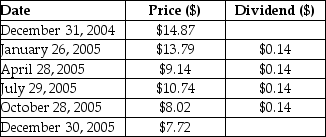 Assume that you purchased Quicksilver's stock at the closing price on December 31, 2004 and sold it at the closing price on December 30, 2005. Your realized annual return for the year 2005 is closest to ________.
Assume that you purchased Quicksilver's stock at the closing price on December 31, 2004 and sold it at the closing price on December 30, 2005. Your realized annual return for the year 2005 is closest to ________.
A) -47.4%
B) -45.1%
C) -42.9%
D) -40.6%
 Assume that you purchased Quicksilver's stock at the closing price on December 31, 2004 and sold it at the closing price on December 30, 2005. Your realized annual return for the year 2005 is closest to ________.
Assume that you purchased Quicksilver's stock at the closing price on December 31, 2004 and sold it at the closing price on December 30, 2005. Your realized annual return for the year 2005 is closest to ________.A) -47.4%
B) -45.1%
C) -42.9%
D) -40.6%

Unlock Deck
Unlock for access to all 110 flashcards in this deck.
Unlock Deck
k this deck
45
The average annual return for the S&P 500 from 1886 to 2006 is 5%, with a standard deviation of 15%. Based on these numbers, what is a 95% confidence interval for 2007's returns?
A) -12.5%, 17.5%
B) -15%, 25%
C) -25%, 35%
D) -25%, 25%
A) -12.5%, 17.5%
B) -15%, 25%
C) -25%, 35%
D) -25%, 25%

Unlock Deck
Unlock for access to all 110 flashcards in this deck.
Unlock Deck
k this deck
46
Consider the following price and dividend data for Quicksilver Inc.: 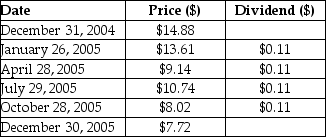 Assume that you purchased Quicksilver's stock at the closing price on December 31, 2004 and sold it after the dividend had been paid at the closing price on January 26, 2005. Your dividend yield for this period is closest to ________.
Assume that you purchased Quicksilver's stock at the closing price on December 31, 2004 and sold it after the dividend had been paid at the closing price on January 26, 2005. Your dividend yield for this period is closest to ________.
A) -7.80%
B) -8.53%
C) 0.74%
D) 0.81%
 Assume that you purchased Quicksilver's stock at the closing price on December 31, 2004 and sold it after the dividend had been paid at the closing price on January 26, 2005. Your dividend yield for this period is closest to ________.
Assume that you purchased Quicksilver's stock at the closing price on December 31, 2004 and sold it after the dividend had been paid at the closing price on January 26, 2005. Your dividend yield for this period is closest to ________.A) -7.80%
B) -8.53%
C) 0.74%
D) 0.81%

Unlock Deck
Unlock for access to all 110 flashcards in this deck.
Unlock Deck
k this deck
47
Consider the following realized annual returns: 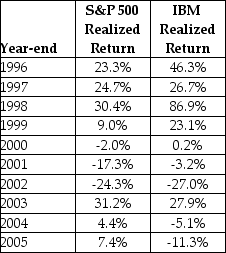 The average annual return on the S&P 500 from 1996 to 2005 is closest to ________.
The average annual return on the S&P 500 from 1996 to 2005 is closest to ________.
A) 8.68%
B) 4.34%
C) 5.21%
D) 9.55%
 The average annual return on the S&P 500 from 1996 to 2005 is closest to ________.
The average annual return on the S&P 500 from 1996 to 2005 is closest to ________.A) 8.68%
B) 4.34%
C) 5.21%
D) 9.55%

Unlock Deck
Unlock for access to all 110 flashcards in this deck.
Unlock Deck
k this deck
48
The average annual return over the period 1926-2009 for the S&P 500 is 12.8%, and the standard deviation of returns is 21.4%. Based on these numbers, what is a 67% confidence interval for 2010 returns?
A) -1.3%, 20.5%
B) -8.6%, 34.2%
C) -25.8%, 54.7%
D) -25.8%, 47.9%
A) -1.3%, 20.5%
B) -8.6%, 34.2%
C) -25.8%, 54.7%
D) -25.8%, 47.9%

Unlock Deck
Unlock for access to all 110 flashcards in this deck.
Unlock Deck
k this deck
49
The average annual return for the S&P 500 from 1886 to 2006 is 9.5%, with a standard deviation of 18%. Based on these numbers, what is a 95% confidence interval for 2007's returns?
A) -13.25%, 22.75%
B) -16.5%, 35.5%
C) -26.5%, 45.5%
D) -11.5%, 30.5%
A) -13.25%, 22.75%
B) -16.5%, 35.5%
C) -26.5%, 45.5%
D) -11.5%, 30.5%

Unlock Deck
Unlock for access to all 110 flashcards in this deck.
Unlock Deck
k this deck
50
Consider the following price and dividend data for Quicksilver Inc.: 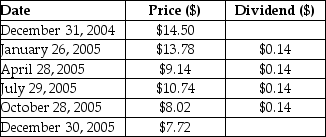 Assume that you purchased Quicksilver's stock at the closing price on December 31, 2004 and sold it after the dividend had been paid at the closing price on January 26, 2005. Your total return rate (yield) for this period is closest to ________.
Assume that you purchased Quicksilver's stock at the closing price on December 31, 2004 and sold it after the dividend had been paid at the closing price on January 26, 2005. Your total return rate (yield) for this period is closest to ________.
A) 0.97%
B) -4.00%
C) -4.97%
D) 1.06%
 Assume that you purchased Quicksilver's stock at the closing price on December 31, 2004 and sold it after the dividend had been paid at the closing price on January 26, 2005. Your total return rate (yield) for this period is closest to ________.
Assume that you purchased Quicksilver's stock at the closing price on December 31, 2004 and sold it after the dividend had been paid at the closing price on January 26, 2005. Your total return rate (yield) for this period is closest to ________.A) 0.97%
B) -4.00%
C) -4.97%
D) 1.06%

Unlock Deck
Unlock for access to all 110 flashcards in this deck.
Unlock Deck
k this deck
51
McCoy paid a one-time special dividend of $3.20 on October 18, 2010. Suppose you bought McCoy stock for $47.00 on July 18, 2010, and sold it immediately after the dividend was paid for $62.93. What was your capital gain yield from holding McCoy?
A) 4.07%
B) 6.11%
C) 33.89%
D) 40.70%
A) 4.07%
B) 6.11%
C) 33.89%
D) 40.70%

Unlock Deck
Unlock for access to all 110 flashcards in this deck.
Unlock Deck
k this deck
52
The average annual return for the S&P 500 from 1886 to 2006 is 15%, with a standard deviation of 25%. Based on these numbers, what is a 95% confidence interval for 2007's returns?
A) -35%, 65%
B) -17.5%, 32.5%
C) -25%, 55%
D) -20%, 50%
A) -35%, 65%
B) -17.5%, 32.5%
C) -25%, 55%
D) -20%, 50%

Unlock Deck
Unlock for access to all 110 flashcards in this deck.
Unlock Deck
k this deck
53
The average annual return over the period 1926-2009 for small stocks is 21.2%, and the standard deviation of returns is 21.2%. Based on these numbers, what is a 95% confidence interval for 2010 returns?
A) -10.6%, 31.8%
B) 0%, 42.4%
C) -21.2%, 42.4%
D) -21.2%, 63.6%
A) -10.6%, 31.8%
B) 0%, 42.4%
C) -21.2%, 42.4%
D) -21.2%, 63.6%

Unlock Deck
Unlock for access to all 110 flashcards in this deck.
Unlock Deck
k this deck
54
Which of the following statements is FALSE?
A) The geometric average return is a better description of the long-run historical performance of an investment.
B) The geometric average return will always be above the arithmetic average return, and the difference grows with the volatility of the annual returns.
C) The compounded geometric average return is most often used for comparative purposes.
D) We should use the arithmetic average return when we are trying to estimate an investment's expected return over a future horizon based on its past performance.
A) The geometric average return is a better description of the long-run historical performance of an investment.
B) The geometric average return will always be above the arithmetic average return, and the difference grows with the volatility of the annual returns.
C) The compounded geometric average return is most often used for comparative purposes.
D) We should use the arithmetic average return when we are trying to estimate an investment's expected return over a future horizon based on its past performance.

Unlock Deck
Unlock for access to all 110 flashcards in this deck.
Unlock Deck
k this deck
55
The average annual return over the period 1926-2009 for the S&P 500 is 12.0%, and the standard deviation of returns is 21.3%. Based on these numbers, what is a 95% confidence interval for 2010 returns?
A) -1.5%, 21.8%
B) -10.7%, 32.8%
C) -30.6%, 54.6%
D) -30.6%, 76.4%
A) -1.5%, 21.8%
B) -10.7%, 32.8%
C) -30.6%, 54.6%
D) -30.6%, 76.4%

Unlock Deck
Unlock for access to all 110 flashcards in this deck.
Unlock Deck
k this deck
56
If a stock pays dividends at the end of each quarter, with realized returns of R1, R2, R3, and R4 each quarter, then the annual realized return is calculated as ________.
A) Rannual = (1 + R1) (1 + R2) (1 + R3)( 1 + R4) - 1
B) Rannual = R1 + R2 + R3 + R4
C) Rannual = (1 + R1) (1 + R2)( 1 + R3)( 1 + R4)
D) Rannual =
A) Rannual = (1 + R1) (1 + R2) (1 + R3)( 1 + R4) - 1
B) Rannual = R1 + R2 + R3 + R4
C) Rannual = (1 + R1) (1 + R2)( 1 + R3)( 1 + R4)
D) Rannual =


Unlock Deck
Unlock for access to all 110 flashcards in this deck.
Unlock Deck
k this deck
57
Which type of investment has historically had the highest volatility?

Unlock Deck
Unlock for access to all 110 flashcards in this deck.
Unlock Deck
k this deck
58
Consider the following price and dividend data for Quicksilver Inc.: 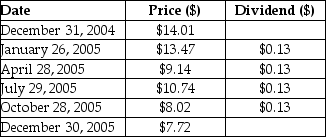 Assume that you purchased Quicksilver's stock at the closing price on December 31, 2004 and sold it after the dividend had been paid at the closing price on January 26, 2005. Your capital gains rate (yield) for this period is closest to ________.
Assume that you purchased Quicksilver's stock at the closing price on December 31, 2004 and sold it after the dividend had been paid at the closing price on January 26, 2005. Your capital gains rate (yield) for this period is closest to ________.
A) 0.93%
B) 1.02%
C) -3.85%
D) -2.93%
 Assume that you purchased Quicksilver's stock at the closing price on December 31, 2004 and sold it after the dividend had been paid at the closing price on January 26, 2005. Your capital gains rate (yield) for this period is closest to ________.
Assume that you purchased Quicksilver's stock at the closing price on December 31, 2004 and sold it after the dividend had been paid at the closing price on January 26, 2005. Your capital gains rate (yield) for this period is closest to ________.A) 0.93%
B) 1.02%
C) -3.85%
D) -2.93%

Unlock Deck
Unlock for access to all 110 flashcards in this deck.
Unlock Deck
k this deck
59
What are the two components of realized return from a stock investment?

Unlock Deck
Unlock for access to all 110 flashcards in this deck.
Unlock Deck
k this deck
60
Consider the following realized annual returns: 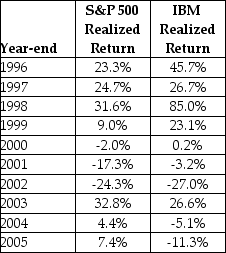 The average annual return on IBM from 1996 to 2005 is closest to ________.
The average annual return on IBM from 1996 to 2005 is closest to ________.
A) 18.48%
B) 16.07%
C) 19.28%
D) 28.93%
 The average annual return on IBM from 1996 to 2005 is closest to ________.
The average annual return on IBM from 1996 to 2005 is closest to ________.A) 18.48%
B) 16.07%
C) 19.28%
D) 28.93%

Unlock Deck
Unlock for access to all 110 flashcards in this deck.
Unlock Deck
k this deck
61
Is volatility a reasonable measure of risk when evaluating large portfolios?

Unlock Deck
Unlock for access to all 110 flashcards in this deck.
Unlock Deck
k this deck
62
Which of the following statements is FALSE?
A) On average, larger stocks have higher volatility than smaller stocks.
B) Portfolios of large stocks are typically less volatile than individual large stocks.
C) On average, smaller stocks have higher returns than larger stocks.
D) On average, Treasury Bills have lower returns than corporate bonds.
A) On average, larger stocks have higher volatility than smaller stocks.
B) Portfolios of large stocks are typically less volatile than individual large stocks.
C) On average, smaller stocks have higher returns than larger stocks.
D) On average, Treasury Bills have lower returns than corporate bonds.

Unlock Deck
Unlock for access to all 110 flashcards in this deck.
Unlock Deck
k this deck
63
Consider the following average annual returns: 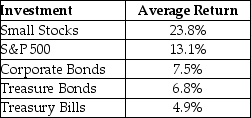 What is the excess return for corporate bonds?
What is the excess return for corporate bonds?
A) 2.6%
B) 1.3%
C) 5.2%
D) 0%
 What is the excess return for corporate bonds?
What is the excess return for corporate bonds?A) 2.6%
B) 1.3%
C) 5.2%
D) 0%

Unlock Deck
Unlock for access to all 110 flashcards in this deck.
Unlock Deck
k this deck
64
Rational investors may be willing to choose an investment that has additional risk but does not offer additional reward.

Unlock Deck
Unlock for access to all 110 flashcards in this deck.
Unlock Deck
k this deck
65
There is an overall relationship between ________ and ________. Larger stocks have a lower volatility overall.
A) size, risk
B) mean, standard deviation
C) risk aversion, size
D) volatility, mean
A) size, risk
B) mean, standard deviation
C) risk aversion, size
D) volatility, mean

Unlock Deck
Unlock for access to all 110 flashcards in this deck.
Unlock Deck
k this deck
66
Is volatility a reasonable measure of risk when evaluating the investment in a single stock?

Unlock Deck
Unlock for access to all 110 flashcards in this deck.
Unlock Deck
k this deck
67
There is a clear link between the volatility of returns for individual stocks and the returns for individual stocks.

Unlock Deck
Unlock for access to all 110 flashcards in this deck.
Unlock Deck
k this deck
68
The risk that inflation rates are likely to increase in the next year is an example of common risk.

Unlock Deck
Unlock for access to all 110 flashcards in this deck.
Unlock Deck
k this deck
69
Consider the following average annual returns: 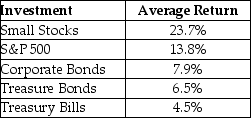 What is the excess return for the S&P 500?
What is the excess return for the S&P 500?
A) 11.5%
B) 16.3%
C) 0%
D) 9.3%
 What is the excess return for the S&P 500?
What is the excess return for the S&P 500?A) 11.5%
B) 16.3%
C) 0%
D) 9.3%

Unlock Deck
Unlock for access to all 110 flashcards in this deck.
Unlock Deck
k this deck
70
A portfolio of stocks where each stock has a large component of independent risk benefits when such stocks are held in a portfolio, because the independent risks are averaged out. This is also referred to as diversification of risks.

Unlock Deck
Unlock for access to all 110 flashcards in this deck.
Unlock Deck
k this deck
71
Which of the following statements is FALSE?
A) Expected return should rise proportionately with volatility.
B) Investors would not choose to hold a portfolio that is more volatile unless they expected to earn a higher return.
C) Smaller stocks have lower volatility than larger stocks.
D) The largest stocks are typically more volatile than a portfolio of large stocks.
A) Expected return should rise proportionately with volatility.
B) Investors would not choose to hold a portfolio that is more volatile unless they expected to earn a higher return.
C) Smaller stocks have lower volatility than larger stocks.
D) The largest stocks are typically more volatile than a portfolio of large stocks.

Unlock Deck
Unlock for access to all 110 flashcards in this deck.
Unlock Deck
k this deck
72
Historical evidence on the returns of large portfolios of stock and bonds shows that investments with higher volatility have rewarded investors with higher returns.

Unlock Deck
Unlock for access to all 110 flashcards in this deck.
Unlock Deck
k this deck
73
While ________ seems to be a reasonable measure of risk when evaluating a large portfolio, the ________ of an individual security does not explain the size of its average return.
A) volatility, volatility
B) the mean return, standard deviation
C) mode, volatility
D) mode, mean return
A) volatility, volatility
B) the mean return, standard deviation
C) mode, volatility
D) mode, mean return

Unlock Deck
Unlock for access to all 110 flashcards in this deck.
Unlock Deck
k this deck
74
Consider the following average annual returns: 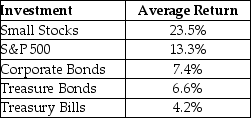 What is the excess return for Treasury bills?
What is the excess return for Treasury bills?
A) 0%
B) -9.1%
C) -3.2%
D) -2.4%
 What is the excess return for Treasury bills?
What is the excess return for Treasury bills?A) 0%
B) -9.1%
C) -3.2%
D) -2.4%

Unlock Deck
Unlock for access to all 110 flashcards in this deck.
Unlock Deck
k this deck
75
The excess return is the difference between the average return on a security and the average return for ________.
A) Treasury bonds
B) a portfolio of securities with similar risk
C) a broad-based market portfolio like the S&P 500 index
D) Treasury bills
A) Treasury bonds
B) a portfolio of securities with similar risk
C) a broad-based market portfolio like the S&P 500 index
D) Treasury bills

Unlock Deck
Unlock for access to all 110 flashcards in this deck.
Unlock Deck
k this deck
76
A portfolio of stocks can achieve diversification benefits if the stocks that comprise the portfolio are ________.
A) not perfectly positively correlated
B) perfectly correlated
C) susceptible to common risks only
D) both B and C
A) not perfectly positively correlated
B) perfectly correlated
C) susceptible to common risks only
D) both B and C

Unlock Deck
Unlock for access to all 110 flashcards in this deck.
Unlock Deck
k this deck
77
Which of the following statements is TRUE?
A) On average, smaller stocks have lower volatility than Treasury bills.
B) Portfolios of smaller stocks are typically less volatile than individual small stocks.
C) On average, smaller stocks have lower returns than larger stocks.
D) On average, Treasury bills have higher returns than stocks.
A) On average, smaller stocks have lower volatility than Treasury bills.
B) Portfolios of smaller stocks are typically less volatile than individual small stocks.
C) On average, smaller stocks have lower returns than larger stocks.
D) On average, Treasury bills have higher returns than stocks.

Unlock Deck
Unlock for access to all 110 flashcards in this deck.
Unlock Deck
k this deck
78
Consider the following average annual returns: 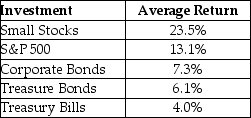 What is the excess return for the portfolio of small stocks?
What is the excess return for the portfolio of small stocks?
A) 11.7%
B) 16.6%
C) 19.5%
D) 17.6%
 What is the excess return for the portfolio of small stocks?
What is the excess return for the portfolio of small stocks?A) 11.7%
B) 16.6%
C) 19.5%
D) 17.6%

Unlock Deck
Unlock for access to all 110 flashcards in this deck.
Unlock Deck
k this deck
79
Which of the following statements is FALSE?
A) Investments with higher volatility have rewarded investors with higher average returns.
B) Investments with higher volatility should have a higher risk premium and, therefore, higher returns.
C) Volatility seems to be a reasonable measure of risk when evaluating returns on large portfolios and the returns of individual securities.
D) Riskier investments must offer investors higher average returns to compensate them for the extra risk they are taking on.
A) Investments with higher volatility have rewarded investors with higher average returns.
B) Investments with higher volatility should have a higher risk premium and, therefore, higher returns.
C) Volatility seems to be a reasonable measure of risk when evaluating returns on large portfolios and the returns of individual securities.
D) Riskier investments must offer investors higher average returns to compensate them for the extra risk they are taking on.

Unlock Deck
Unlock for access to all 110 flashcards in this deck.
Unlock Deck
k this deck
80
When looking at investment portfolios historically, was there a pattern between returns and volatility?

Unlock Deck
Unlock for access to all 110 flashcards in this deck.
Unlock Deck
k this deck


